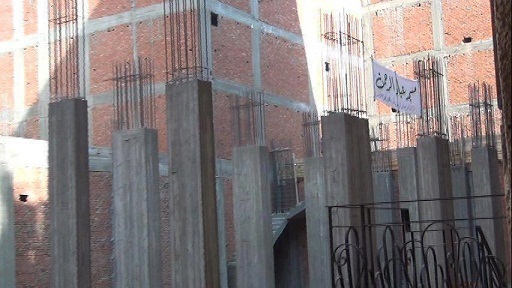
The diocesan headquarters of the Coptic church in Shubra Al-Kheima was stormed by Salafis on Monday after afternoon prayers. The group raised a banner reading “Rahma Mosque” and remained on the premises until prayers at dawn, when the Interior Ministry intervened and removed the group.
The Salafis took over an area of the diocese headquarters used for services, that had been governmentally licensed, and claimed it as a Muslim place of worship, said Bishop Morcos of Shubra in a telephone interview on Al-Tahrir channel. “We want to know what the government will do.”
“They claimed that the land is owned by a Muslim, despite the issuance of permits for the service building of the church,” said the Maspero Youth Union (MYU) in a statement.
“As a party and coalition refuse any assaults, because they provoke sectarian strife,” said Amir Boshra, a member of the Free Egyptians Party (FEP) and the MYU. “We don’t want things to escalate, but there are Muslims and Christians and parties who are against this situation, and will resolve it by force if necessary.”
The Salafi group left after dawn prayers, said Ishak Ibrahim, a researcher for the Egyptian Initiative for Personal Rights (EIPR).
“This episode is part of a series of attacks surrounding the role of Christian worship after the revolution,” the MYU said. The group blamed the government and security apparatus of being slow to act and sustaining their complicity in attacks on Copts and their churches.
“The Coptic youth feel intense anger and disappointment as a result of the recklessness of the regime in dealing with such incidents and perpetrators,” said the MYU.
The Coalition of Copts in Egypt called on President Mohamed Morsy to act against the perpetrators and pre-empt future similar situations, asking him and the Interior Ministry to implement frameworks that would allow them to act more rapidly to sectarian incidents.
The Egyptian Social Democratic Party also condemned Monday’s events in a statement, calling for the intruders to be punished, but also expressed appreciation for police and security forces that had worked to remove the Salafis early Tuesday morning.
Bishop Tawadros, who was selected as the Coptic Orthodox church’s 118th pope on Sunday, stated in a television interview on Monday that the state needed to take stronger steps to make Egypt’s Christians feel safer, calling the displacement of Copts “unacceptable.”
Sectarian incidents have increased since the revolution last year, including cases of Christians being displaced from their homes. Christians in Rafah left their homes after being threatened in September. The Giza village of Dahshur was the site of sectarian clashes in August that resulted in roughly 100 Christian families fleeing, as their homes and businesses were burned and looted.
In both incidents, most of the Christians returned to their homes after the government provided adequate security.

